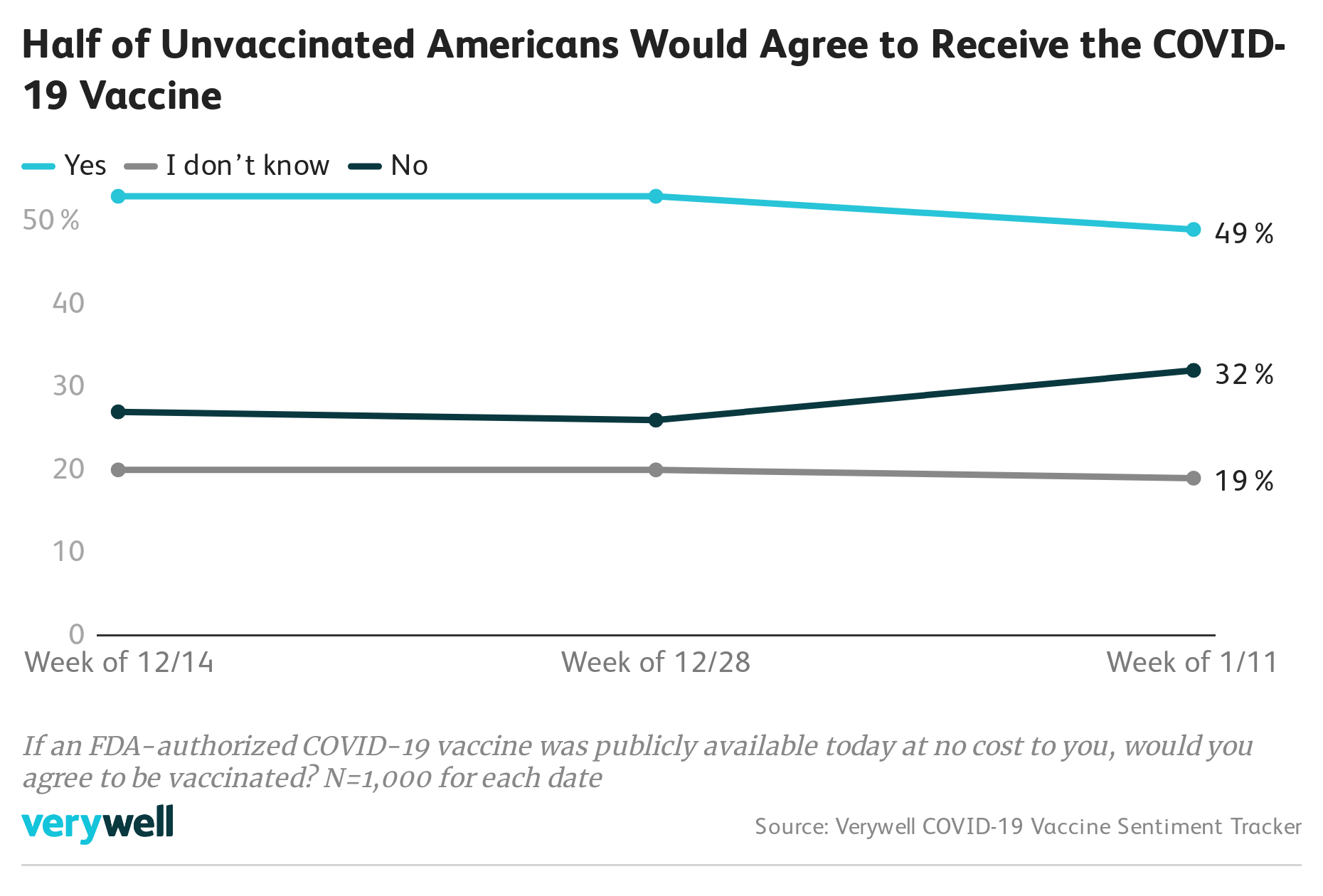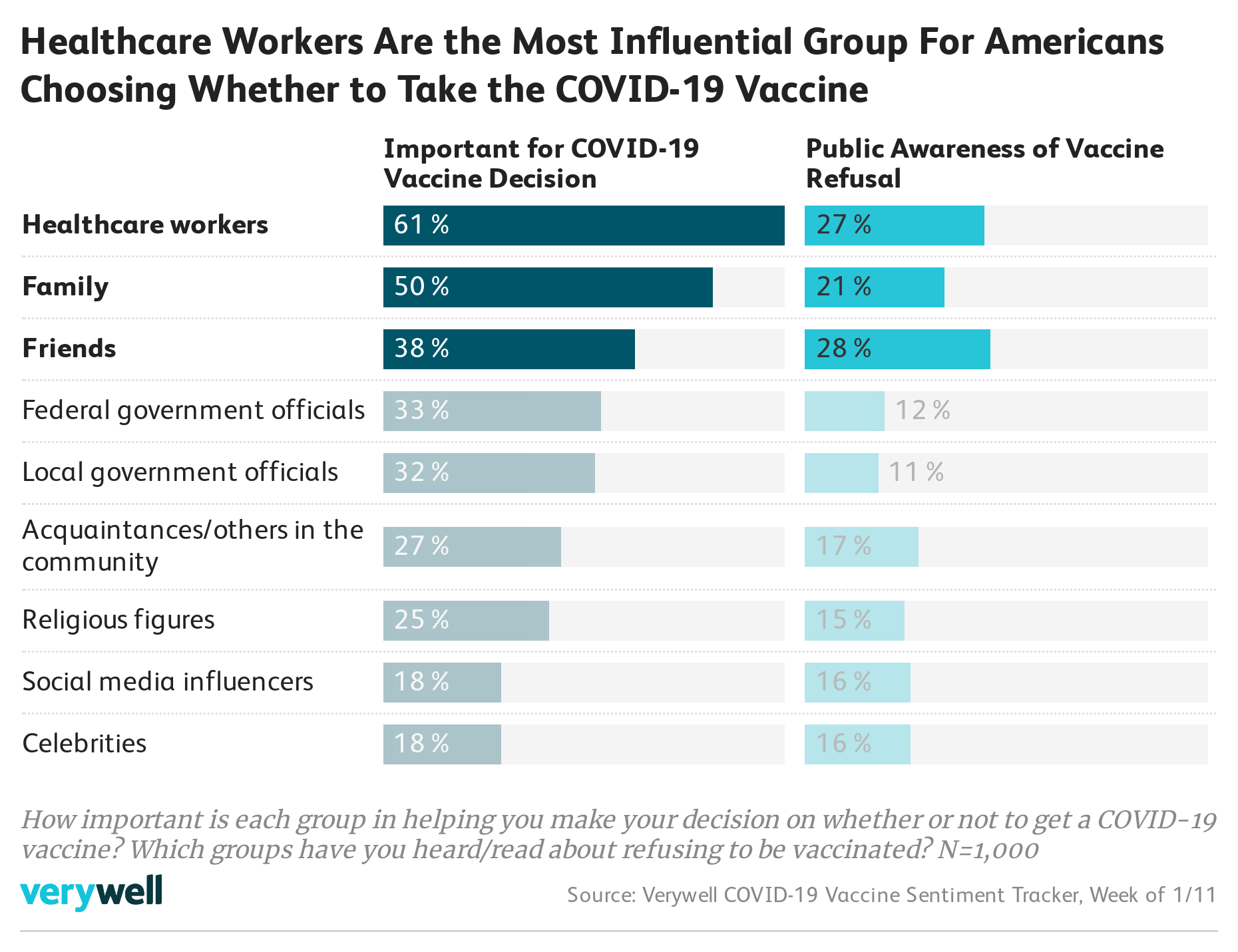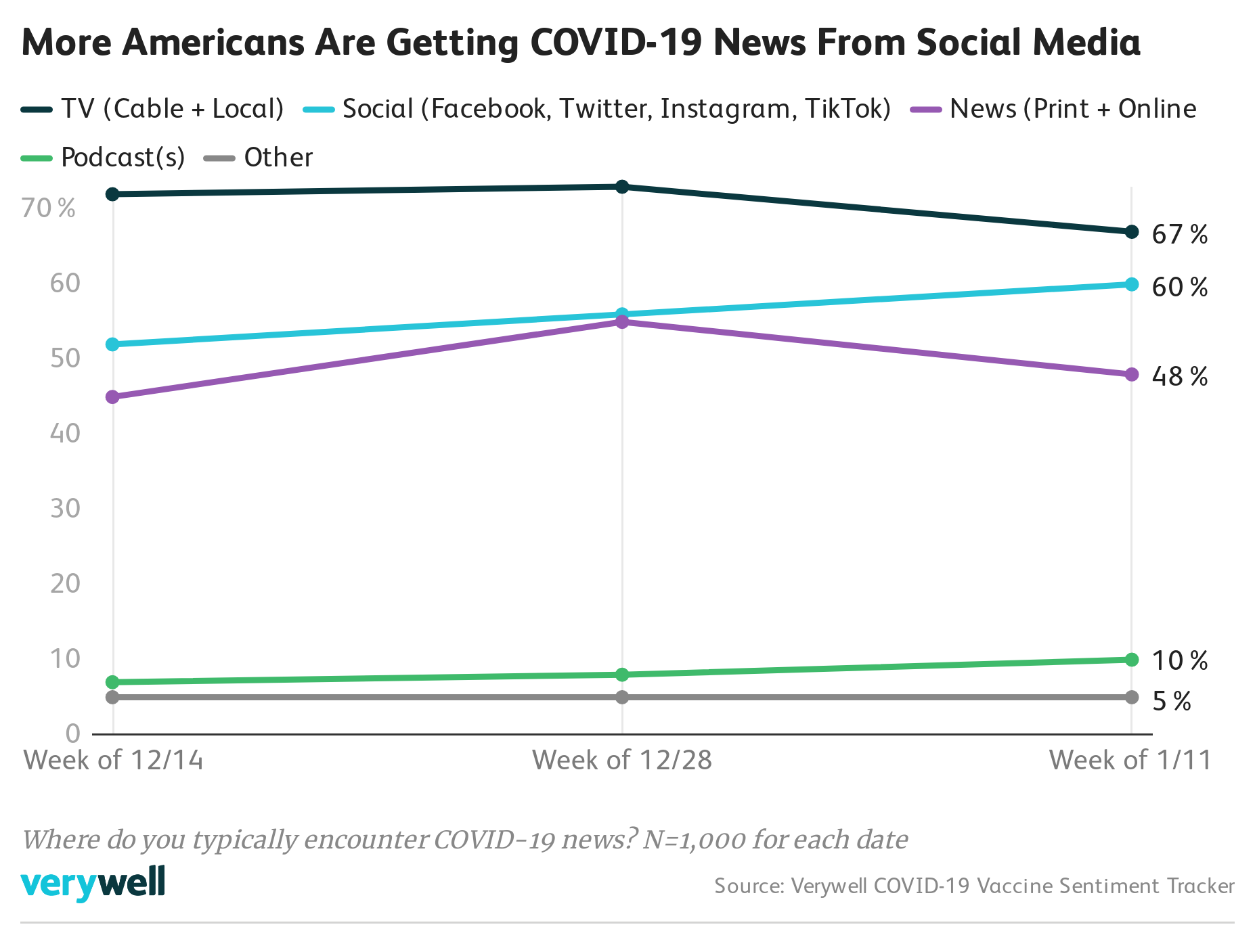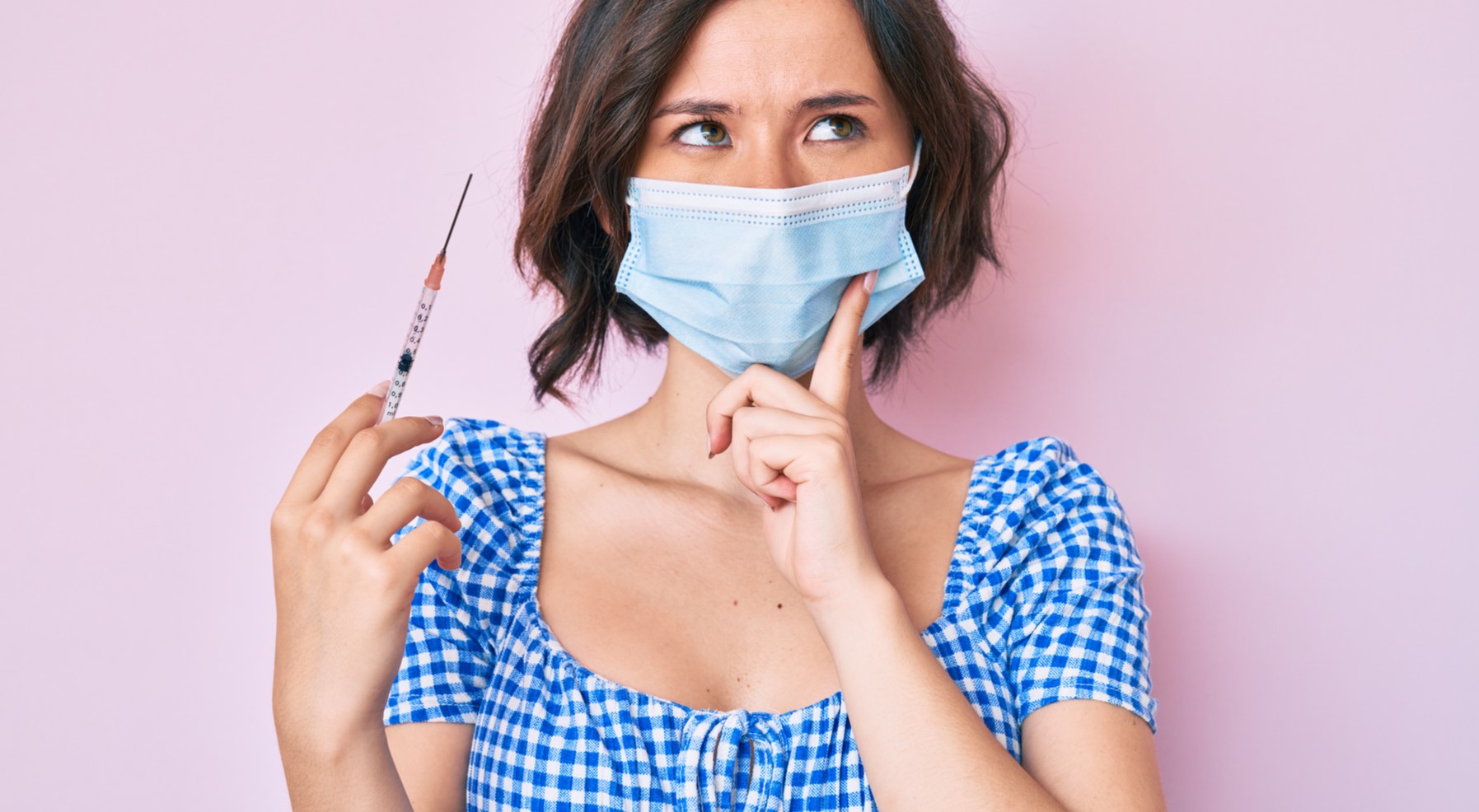In mid-December, Verywell Health launched a bi-weekly, representative sample survey to measure attitudes and behaviors towards COVID-19 vaccines. The goal of this 1,000-person study is to track Americans’ feelings and how those sentiments might (or might not) change over time.
Unfortunately, the data so far shows that we are not moving in the right direction. We identified three distinct groups: acceptors (those who would agree to take a vaccine); undecideds (those who do not know if they would agree to take a vaccine); and rejectors (those who would not agree to take a vaccine). In our first wave, this was the breakdown:
- Acceptors: 53%
- Undecideds: 20%
- Rejectors: 27%
The most recent wave broke out to 49% acceptors, 19% undecideds, and 32% rejectors. In a time period when over 53,000 people died from COVID-19, our survey showed that fewer people would be willing to take the vaccine.
 Verywell Health’s survey is not the only one to come to the conclusion that vaccine rejection is substantial and hard to move. But it is critical to go a layer deeper and understand the “why,” and be aware of the sources of information that might help get at the heart of vaccine hesitancy. This insight will help inform a proper communication and education strategy to mitigate any concerns and increase vaccination rates. We need to understand the challenge, the message, and the best methods and voices to deliver that message.
Verywell Health’s survey is not the only one to come to the conclusion that vaccine rejection is substantial and hard to move. But it is critical to go a layer deeper and understand the “why,” and be aware of the sources of information that might help get at the heart of vaccine hesitancy. This insight will help inform a proper communication and education strategy to mitigate any concerns and increase vaccination rates. We need to understand the challenge, the message, and the best methods and voices to deliver that message.
The Challenge
If a person is an acceptor, that’s great. If a person is a rejector, it’s unlikely they’ll change their mind. The people who are most impressionable at this point are the undecideds. Yet, we have an ability, and a responsibility, to help educate both.
 According to our data, people who are hesitant about the COVID-19 vaccine do not necessarily have general trust issues with vaccines. Compared to COVID-19 vaccine rejectors, undecideds are only about half as likely to distrust vaccines or pharmaceutical companies. The primary problems are 88% and 69% of undecided respondents cite side effects and effectiveness among their top three concerns for not wanting to take the COVID-19 vaccine, respectively.
According to our data, people who are hesitant about the COVID-19 vaccine do not necessarily have general trust issues with vaccines. Compared to COVID-19 vaccine rejectors, undecideds are only about half as likely to distrust vaccines or pharmaceutical companies. The primary problems are 88% and 69% of undecided respondents cite side effects and effectiveness among their top three concerns for not wanting to take the COVID-19 vaccine, respectively.
The Message
In order to move the needle toward higher acceptance, the messaging needs to be squarely centered on COVID-19 vaccine side effects and effectiveness.
The truth is, the vast majority of side effects are mild. Fatigue is the most common, followed by muscle ache, joint stiffness, and headache. These responses are the body’s sign that the immune system is revving up. Serious side effects are extremely rare. According to the CDC, out of two million shots administered, less than two dozen resulted in anaphylactic reactions. Guidance remains in place to wait 30 minutes before leaving the vaccination site to ensure any complications like this, although exceedingly rare, can be treated immediately.
When it comes to effectiveness, the messaging has been complicated by new variants and lower efficacy of specific emerging vaccines, but we should simultaneously educate people on any COVID-19 vaccines effectiveness for lowering vaccine transmission and for protection against serious illness. According to Dr. Anthony Fauci, Director of the NIAID, “…even when you have a variant circulating in which you may not have a 95% efficacy to prevent infection, it is very important that you might very very positively prevent serious illness and serious disease.” When it comes to avoiding life-threatening, life-changing cases of COVID-19, the vaccines are certainly believed to be efficacious and worth taking.
Delivery of the Message
All that matters in the delivery is trust. According to our study, Americans trust healthcare workers (61%) the most for their health information and guidance, followed by friends and family (50%). Government officials had lower levels of trust (32%).
 We’re all talking about the vaccine more and more. And the trust in family and friends we see in our survey aligns with respondents showing an increase in consumption of COVID-19 information from social media (driven mostly by Facebook). Sixty percent of respondents get COVID-19 information from social media, up from 52% in our first survey wave. But trust in these sources doesn’t necessarily mean they’re getting accurate information.
We’re all talking about the vaccine more and more. And the trust in family and friends we see in our survey aligns with respondents showing an increase in consumption of COVID-19 information from social media (driven mostly by Facebook). Sixty percent of respondents get COVID-19 information from social media, up from 52% in our first survey wave. But trust in these sources doesn’t necessarily mean they’re getting accurate information.
 Health publishers with accurate and objective COVID-19 vaccine information have a significant role to play. It is crucial that trustworthy and accurate information is shared with the right people—the undecideds, and even the rejectors. If that doesn’t happen, COVID-19 will continue to spread, with more and more lives lost. But if it does happen, vaccine rates will quickly climb. We’re all ready for our lives to go back to some semblance of normalcy.
Health publishers with accurate and objective COVID-19 vaccine information have a significant role to play. It is crucial that trustworthy and accurate information is shared with the right people—the undecideds, and even the rejectors. If that doesn’t happen, COVID-19 will continue to spread, with more and more lives lost. But if it does happen, vaccine rates will quickly climb. We’re all ready for our lives to go back to some semblance of normalcy.








